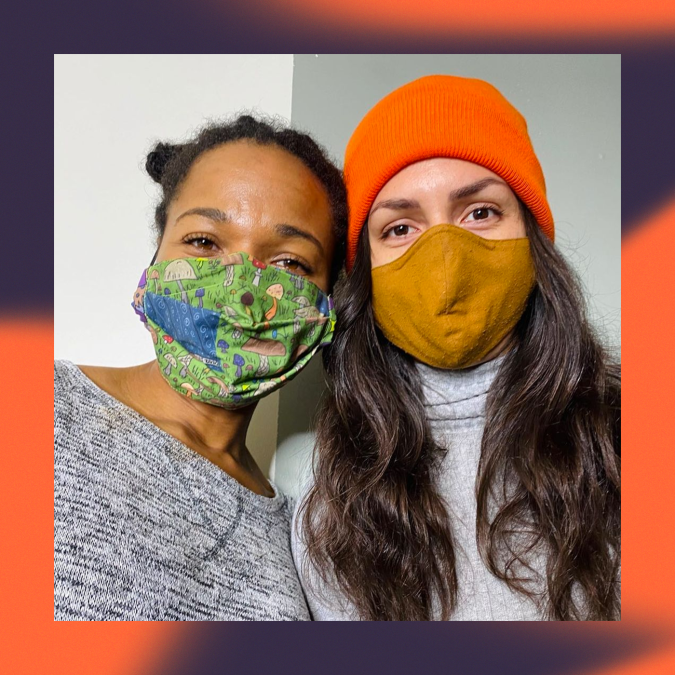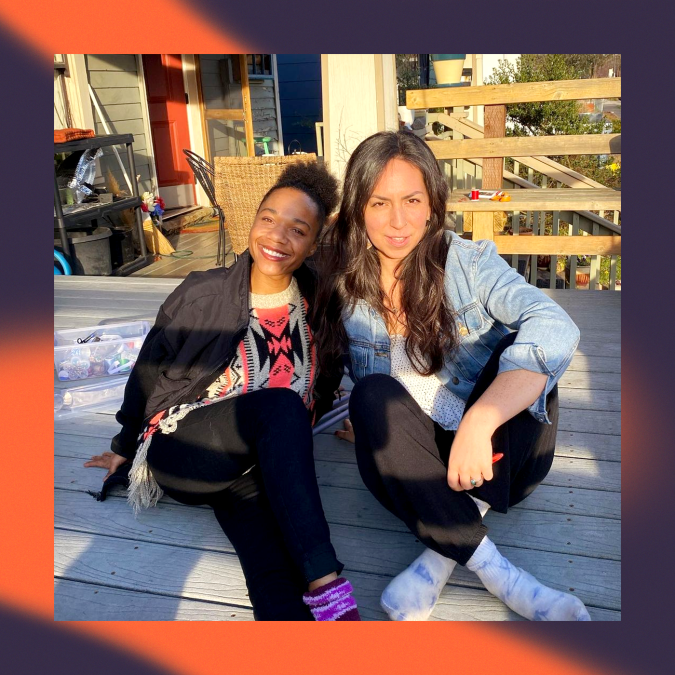Last November, Oregon voters passed a measure that legalized the use of psilocybin mushrooms for therapeutic purposes, becoming the first state in the country to do so. Starting in 2023, licensed therapists will be able to use psilocybin to treat chronic mental health issues, including depression, addiction and PTSD. Despite 55% of voters approving the measure, there remains a lot of confusion and stigma around psychedelic therapy, particularly among communities of color who haven’t been centered in research or culture. That’s why Rebecca Martinez and Elan Hagens launched the Fruiting Bodies Collective, an online community and educational platform advocating for inclusion in psychedelics.
Witnessing how communities of color, who are overwhelming targeted and criminalized under the War on Drugs, were shut out of the cannabis industry, the collective’s goal is to educate, through free and low-cost e-books, informational downloads and podcast episodes, as well as build connections that ensure BIPOC and queer folk have access to psilocybin therapy and can share in what is expected to become a booming industry.
We spoke with Martinez, a Portland-based author, organizer and Fruiting Bodies’ creative lead, about psilocybin healing, the collective’s objectives and why she finds it necessary to merge social justice with the psychedelic renaissance.
Before we talk about the work of Fruiting Bodies Collective, can you speak to the significance of Oregon voters passing Measure 109?

Part of what has made this program so exciting and put it in a global spotlight is that it’s the absolute first of its kind. There’s no model yet for a state-wide measure that creates this self-contained therapeutic model, especially outside of the FDA and psychiatric and medical frameworks. So the fact that voters voted for it shows that people are really willing to innovate on the ways that we get these medicines out to the people who need them and that they really want to be involved. I was a volunteer organizer on the Measure 109 campaign, and just seeing the level of passion, drive, care and even some concern that people have on how this gets out to people was amazing. And it’s not just in Oregon. We’re getting contacted by people in Europe and Australia who are eager to see what happens, because if we fulfill our aim, then we may be able to create a replicable model that other states and even other countries could work off of.
What would psilocybin therapy look like in Oregon come 2023?
It could be a new clinic that pops up that is specifically focused on psilocybin therapy or these programs can be available at existing establishments, like mental health centers or a center in a hospital. Either way, it’ll be a three-part model: there will be three sessions, and one is optional. The first is the required preparation session where you’ll meet with the facilitator and they will go through a health screening to secure safety and establish trust. If all goes well and everyone feels good, then they’ll schedule the actual administration session, where the person will actually take the mushroom and be in the company of the facilitator. That will be the full length of a day, and after that experience, the facilitator will offer to schedule an integration session before the client leaves. The three-part model is one we’re putting forth because preparation and integration are as essential as the actual experience. It’s how you draw meaning and benefits out of an experience.

Psilocybin and psychedelic healing intersects with collective healing, justice and anti-oppression work.
Let’s get to Fruiting Bodies Collective. What sort of education will people gain from this platform and who is it for?
Our goal is to educate people who are in Oregon or nearby and feel like they can benefit from treatment. We want to expand the conversation toward people who may not be aware of psilocybin or the psychedelic healing movement because racial or socioeconomic factors made them feel like it’s not relevant to them. The reason we started this now is because we know that we have this two-year lead time, and it takes a long time to shape culture and destigmatize certain things, and a lot of what it will take to accomplish that is ongoing conversations, education and relationship-building. We thought, ‘well what if we start now and really go beyond Oregon?’This is a global community. Let’s have conversations about how psilocybin and psychedelic healing intersects with collective healing, justice and anti-oppression work. We’re really trying to bridge those two communities but at a grassroots level. So our end goal is to help people who could benefit from these treatments have access to them and to advocate on their behalf.


What does that look like, bridging psychedelic healing with anti-oppression work?
One thing that we’ve witnessed in the psychedelic movement is it’s a pretty homogenous community. Historically, it’s tended to be more for privileged white folk, largely because of the impact of the War on Drugs and other cultural stigmas. There’s also this psychedelic culture that thinks, ‘Well, I have been awakened, and so I can’t possibly contribute to systems of oppression. I don’t see color.’ There can be a lot of bypassing in the community, wanting to believe like we’re all just one big happy family and that conversations about race are divisive. But when that conversation is coming from a dominant culture of people, it can be really silencing and harmful. However, we also know that, because of the moment we’re in where people are really starting to understand oppression, there are groups within the psychedelics community that are ready to have conversations and are ready to use psychedelics as a vehicle to go deeper into ourselves and dismantle these things that we may not even see in our sober or conscious mind.
Our long-term goal is to change the culture around healing.
We have a lot of hope. We believe these experiences can actually help us unpack those things if we go into it with that sort of intention and that facilitation. I dream of like, what if we had retreat centers that were focused on anti-oppression work and had facilitators that were trained in that and psilocybin therapy? We don’t have a model for that. We’ll see if that’s possible, but my dream is to bridge those things.
One of your primary goals in co-creating Fruiting Bodies is to ensure that the mistakes of the cannabis industry aren’t made in the rising psychedelic industry, mainly that Black, Indigenous and people of color who have historically been most impacted by the War on Drugs can reap the benefits and gain opportunities from this program from the start. How do you do that?
Within cannabis, it seems like we’re trying to work backwards and trying to repair something that we built and isn’t serving the way we want it to. So we have this immediate opportunity with psilocybin therapy to take all of those lessons and on day one start off on the right foot because we’ve learned from those mistakes. We work closely with the Healing Advocacy Fund and several other groups and are thinking deeply about what that actually looks like in practical terms, whether it’s through licensing, outreach in certain communities or having ambassadors that help spread the word. There’s many ways on the state level that we can do it, but I think proactivity has to be central in how this is rolled out because equity, fairness and justice aren’t just going to happen on their own. There are a lot of other forces and people with dollar signs in their eyes right now that we have to contend with.

You recently published a book called Edge Play that shares your journey of psychedelic healing. I think for most people, there remains a lot of questions around psychedelics, partly because it’s been demonized for so long. Can you demystify this a bit for us?
I think of psychedelic healing and medicine as a catalyst rather than a whole body of healing within itself. These experiences that you can have with the help of psychedelics are peak experiences. You may spend a day going into some really deep innerwork and uncovering some understanding about yourself, your personal history, your relationships or expanding your perspective about your life and belonging. There are so many insights you can gain within that space that can be so healing. Our culture is so loud, so in one way it’s just an opportunity to get quiet and be with yourself and look deeply at the world and your heart and history. When people understand it that way, it’s more of a sacrament or a ceremony. The word psychedelic is tricky because, as you mentioned, it’s associated with this kind of culture and maybe there’s some distrust or stigma. People think, ‘Well, I’m not a hippie, so maybe it’s not for me.’ I think the most important part that I want people to understand is that psychedelic medicine is not a cure-all, and it’s a type of medicine that requires active participation. You have to meet the medicine halfway. What you bring in, in terms of your willingness to do the work before and after the experience, how you change your thoughts and habits and work those insights into your life, is largely up to you and getting support from the people around you to do that. That’s why destigmatization is so important because if you don’t have people around you who you can talk to, it can be really hard to get the full benefit of these experiences. You have to spend so much energy explaining to people why it’s a good thing and why it’s really healing.
That’s why we focus a lot on storytelling. We just started a storytelling series on our blog because when you can just hear a story and have it laid out like, this is where you were, this is how you came across this specific compound, this is what your experience was like and how your life is now, if we can paint enough of those pictures, people can start to find the threads that really resonate with them. That’s why I wrote my book. I came out of a very conservative upbringing. I didn’t have a lot of exposure to these things and I learned a lot the hard way. I really believe in the power of storytelling. Statistics are great and clinical trials are great, but what really moves the heart of a culture is seeing ourselves in that and seeing the people we love and how they’re reflected in these stories of healing.
Why do you feel called to this work?
A lot of my personal relationship with this work has been immediate messages from psilocybin mushrooms while in a psilocybin journey myself. The last three times that I’ve had experiences, the War on Drugs has come through so strong. There’s been so much pain and grief. It feels like I have signed a cosmic contract with the mushroom to advocate for it. A lot of people feel called, and I think I have been called to be a disruptor and push the conversation further and to find those who are also doing that and lift them up. It’s deeply personal, and having experienced the ways that mushrooms truly have the potential to help us heal, move through our pain, understand our lives better and deepen our sense of connection to our own ancestry, I know it can heal so many that have been harmed in recent generations. There’s just this deep sense of connection that’s just ineffable. It’s hard to describe in words. And it’s all connected.
There’s this deep sense of connection that’s just ineffable.
Two of my immediate family members have been incarcerated. I’ve seen how prison can destroy lives, and I’ve seen what addiction looks like. I think it was probably always part of my path, but it’s still unexpected. This is a very emerging field. Who would have ever expected, going from a worship leader and young mom to advocating at the state level for people to be able to heal with mushrooms?
What would you say is your long-term goal with this collective, thinking even beyond 2023?
Our long-term goal is a tall order: it’s to change the culture around healing. I think psychedelics are the avenue for us right now, but the larger aim is really liberation and healing for all people, so that may take many forms. We’ll see what goes on with the program specifically, and I will admit, we’re not deeply invested in this as the only model for healing. We will follow what is emergent and what feels really true and aligned and in our best interest as a collective. I would love to see a global movement of people who identify as psychonauts, people who believe in psychedelic healing and who are really dedicated to anti-oppression work in their daily lives. I want to bridge those worlds.




